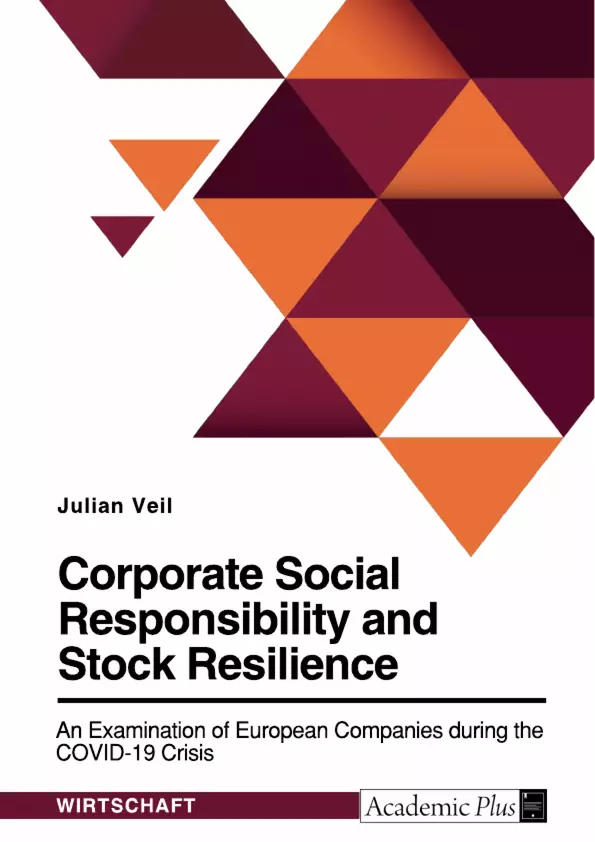In December 2019, the world confronted the outbreak of the SARS-CoV-2 virus, leading to the global spread of COVID-19. The subsequent pandemic, declared by the World Health Organization on March 11, 2020, triggered unprecedented economic uncertainty, causing substantial upheaval in financial markets worldwide. Major indices, including the S&P 500 and DAX 30, recorded significant losses within a short span.
This paper examines the role of corporate social responsibility (CSR) in influencing stock performance during the COVID-19 crisis, focusing on European companies. CSR, defined as "the responsibility of enterprises for their impact on society" by the European Commission, has been suggested as a potential factor in protecting shareholder wealth during crises. The study aims to assess whether companies engaged in CSR activities exhibit better resilience during economic downturns.
The research question driving this study is straightforward: Can engagement in corporate social responsibility shield shareholder wealth from the adverse effects of an economic crisis, mitigating tail risk for European companies? To answer this question, the study analyzes the performance of 428 European companies during the COVID-19 crisis (February 20 - March 23, 2020) and the subsequent recovery period (March 24 - December 31, 2020).
The methodology involves cross-sectional regressions, considering performance measures such as abnormal and raw stock returns, as well as idiosyncratic and stock volatility. CSR performance is approximated using Refinitiv's environmental, social, and governance (ESG) scores for 2019. The analysis includes a set of control variables covering risk, accounting metrics, and corporate governance measures.
This study contributes to the existing literature by exploring the relationship between CSR engagement and stock performance, specifically in the context of the COVID-19 crisis. The subsequent sections delve into the literature review, data description, methodology, empirical results, and a detailed discussion of the findings.
Inhaltsverzeichnis (Table of Contents)
- Introduction
- Literature Review
- Corporate Social Responsibility
- CSR and Corporate Financial Performance
- CSR in Times of Crisis pre-COVID-19 Crisis
- CSR in Times of Crisis post-COVID-19 Crisis
- Data, Variables, and Sample Construction
- CSR Ratings
- Stock Market Data
- Market-based Measures of Risk
- Accounting-based Measures of Performance and Financial Position
- Corporate Governance Measures
- Additional Relevant Variables
- Sample Construction and Summary Statistics
- Methodology
- Model Specification
- Validity
- Omitted Variable Bias
- Selection Bias
- Multicollinearity
- Heteroskedasticity
- Empirical Results
- Performance during the Crisis Period
- Abnormal Stock Returns
- Raw Stock Returns
- Volatility Measures
- Performance during the Recovery Period
- Return Measures
- Volatility Measures
- Specification Checks
- Different CSR Measures
- Further Specification Checks
- Performance during the Crisis Period
- Discussion
Zielsetzung und Themenschwerpunkte (Objectives and Key Themes)
This research aims to investigate the impact of corporate social responsibility (CSR) on firm performance during and after the COVID-19 crisis. The study focuses on a specific timeframe, analyzing how CSR influences stock returns and volatility measures in both the crisis and recovery periods.
- The impact of CSR on firm performance during times of economic crisis.
- The role of CSR in mitigating financial risk during and after a major global event.
- The relationship between CSR and stock market performance, including both returns and volatility.
- The influence of CSR on corporate financial performance in a post-crisis environment.
- The relevance of specific ESG (Environmental, Social, and Governance) factors in shaping firm performance during crisis and recovery periods.
Zusammenfassung der Kapitel (Chapter Summaries)
- Introduction: This chapter introduces the topic of CSR and its significance in times of crisis, providing a background for the study and outlining its main objectives.
- Literature Review: This chapter comprehensively reviews existing literature on CSR, covering concepts like stakeholder theory, the relationship between CSR and financial performance, and the impact of CSR in times of crisis. It also delves into the specific context of the COVID-19 pandemic and its implications for CSR research.
- Data, Variables, and Sample Construction: This chapter details the data sources used in the study, including both financial and CSR-related data. It provides definitions of key variables, describes the sample selection criteria, and presents summary statistics for the data.
- Methodology: This chapter explains the methodological approach adopted for the study, including the model specifications used for analyzing the impact of CSR on firm performance. It also addresses potential threats to validity, such as omitted variable bias and multicollinearity, and discusses strategies for mitigating these issues.
- Empirical Results: This chapter presents the main findings of the empirical analysis, examining the impact of CSR on firm performance during the crisis period and the recovery period. It analyzes both returns and volatility measures, highlighting key trends and patterns observed in the data.
- Discussion: This chapter interprets the findings of the empirical analysis, discussing the implications of the results for both academic research and practical business applications. It considers the limitations of the study and suggests avenues for future research.
Schlüsselwörter (Keywords)
This research centers on the concept of corporate social responsibility (CSR) and its relationship to firm performance, particularly during periods of economic disruption such as the COVID-19 crisis. It investigates the impact of CSR on financial performance metrics like stock returns and volatility, drawing on ESG scores as a key measure of CSR performance. The study also employs a range of statistical techniques to analyze the data, including regression analysis and variance inflation factor (GVIF) checks, to ensure the robustness and validity of the findings.
- Quote paper
- Julian Veil (Author), 2022, Corporate Social Responsibility and Stock Resilience. An Examination of European Companies during the COVID-19 Crisis, Munich, GRIN Verlag, https://www.grin.com/document/1437724



